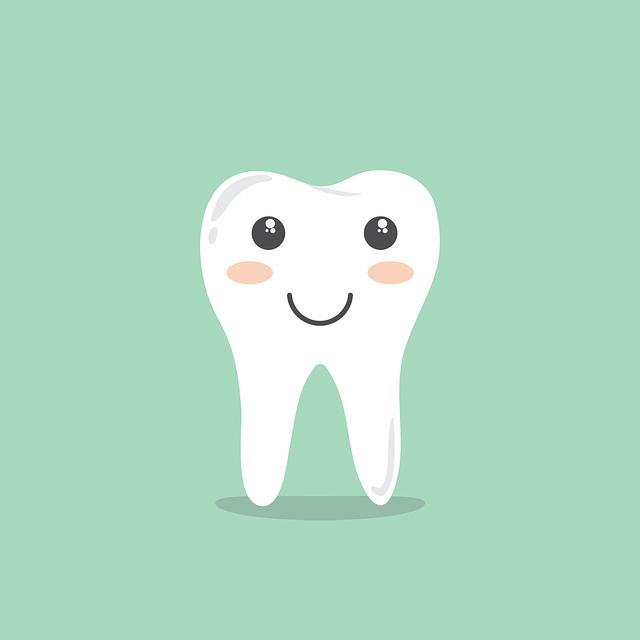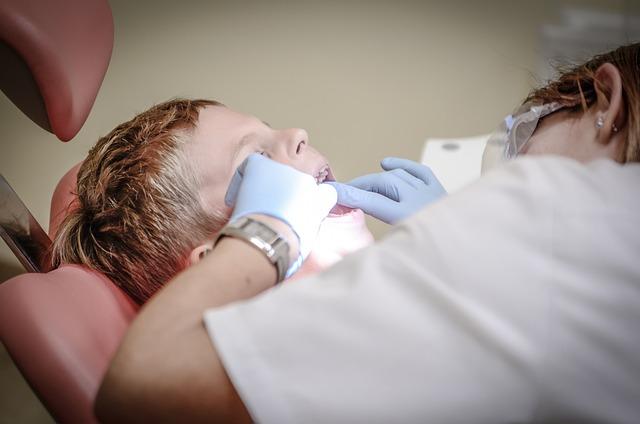Does Gargling Salt Water Help Whiten Teeth? The Dental Scoop
Welcome to “The Dental Scoop,” where we aim to put your oral health queries to rest with confidence, knowledge, and a neutral perspective. Today, we delve into a question that has left many wondering: does gargling salt water help whiten teeth? As your trusted dental resource, we’re here to provide you with a clear and straightforward answer, backed by scientific evidence. So, sit back, relax, and let’s unravel the truth behind this common dental myth.
1. The Science Behind Gargling Salt Water: Separating Fact from Fiction
Saltwater gargling is a common home remedy that has been passed down through generations for its supposed health benefits. But what does science have to say about this practice? Let’s separate fact from fiction and explore the scientific basis behind gargling salt water.
1. Soothing effect: Gargling salt water can help soothe a sore throat by reducing inflammation and irritation. The salt in the water creates a hypertonic solution, drawing out excess fluid from swollen tissues and providing temporary relief.
2. Antibacterial properties: Salt has natural antibacterial properties that can help kill bacteria in the throat. It can disrupt the cell membranes of harmful microorganisms, reducing their ability to thrive and multiply.
3. Mucus clearance: Gargling salt water can assist in clearing mucus and phlegm from the throat. The saline solution helps break down mucus, making it easier to expel and providing a sense of relief.
4. Prevention and recovery: Regular gargling with salt water may help prevent respiratory infections or speed up recovery from a cold or flu. It can help flush out viruses and bacteria lingering in the throat, promoting a healthy environment for the immune system to fight off infections.
Remember, while gargling salt water can provide temporary relief and potentially aid in recovery, it is not a substitute for medical treatment. If you have persistent or severe symptoms, consult a healthcare professional for proper diagnosis and advice.

2. Unveiling the Truth: Can Gargling Salt Water Really Whiten Your Teeth?
Many people have turned to unconventional methods in their quest for whiter teeth, and one popular technique that has gained attention is gargling salt water. But does this simple household remedy really work? Let’s dive into the truth behind this age-old practice.
The science behind it:
- Gargling salt water, also known as saline rinsing, has been used for centuries to treat various oral health problems, such as gingivitis and sore throats.
- While salt water does have some antibacterial properties, it doesn’t possess any tooth-whitening abilities.
- The primary benefits of gargling salt water lie in its ability to temporarily reduce inflammation, kill bacteria, and soothe oral tissues.
The potential drawbacks:
- Excessive use of salt water rinses can lead to dry mouth and increased risk of cavities due to reduced saliva production.
- Although salt water rinsing is generally considered safe, it should not replace regular brushing, flossing, and professional dental cleanings.
- If you’re looking for a truly effective teeth whitening solution, it’s best to consult with your dentist who can recommend safe and proven methods.
The verdict:
Gargling salt water may offer some oral health benefits but it will not magically whiten your teeth. While it’s a safe and inexpensive practice, it is not a substitute for proper oral hygiene or professional teeth whitening treatments. Remember, maintaining good oral health and seeking advice from dental professionals are the key factors in achieving a brighter smile.
3. Debunking Myths: Exploring the Efficacy of Salt Water for Teeth Whitening
When it comes to teeth whitening, many myths and misconceptions abound. One such myth is the efficacy of salt water as a natural teeth whitener. Let’s explore the truth behind this belief and debunk any misunderstandings.
- Salt water does not possess intrinsic teeth whitening properties: While salt water may have some oral health benefits, such as reducing inflammation and killing bacteria, it does not have the ability to chemically whiten teeth. Teeth discoloration is primarily caused by stains that penetrate the enamel, and salt water alone cannot remove these stains.
- Salt water can act as a temporary mouth rinse: Salt water rinses can be beneficial for maintaining oral hygiene and promoting gum health. They can help alleviate minor mouth irritations and reduce bad breath. However, their effects are limited to oral health and do not extend to teeth whitening.
- Professional whitening treatments are more effective: If you are looking to achieve noticeable teeth whitening results, professional treatments offered by dentists are the most reliable option. These treatments utilize advanced techniques and materials that can effectively remove deep stains and brighten your smile.
It’s crucial to rely on scientifically proven methods for teeth whitening, rather than falling for myths that may waste your time and effort. Consult with a dental professional to explore the best teeth whitening options suitable for your individual needs.
4. Understanding the Power of Salt Water Rinse in Dental Hygiene
Salt water rinse is a powerful tool in maintaining good oral hygiene. Its benefits are often overlooked, but incorporating this simple practice into your dental routine can greatly enhance your overall oral health. Here are some key points to understand about the power of salt water rinse:
1. Natural disinfectant: Salt water has natural antiseptic properties that can help kill bacteria and reduce inflammation in the mouth. It can effectively cleanse wounds, promote healing, and prevent infection. By rinsing with salt water, you can reduce the risk of gum disease, tooth decay, and other oral infections.
2. Soothing effect: Salt water rinse can provide relief from various dental issues, such as sore gums, mouth ulcers, and toothaches. The warm salt water solution can help alleviate discomfort, reduce swelling, and promote quicker healing. It acts as a natural mouthwash, providing a soothing and refreshing sensation.
3. Easy to make and use: Creating a salt water rinse is simple and cost-effective. All you need is warm water and salt. Dissolve half a teaspoon of salt in a cup of warm water, then swish the solution around your mouth for 30 seconds to 1 minute. Spit it out and repeat as needed. Remember not to swallow the mixture.
Incorporating salt water rinse into your daily dental routine can be a game-changer for your oral health. Its natural disinfectant properties, soothing effects, and ease of use make it a valuable addition to your oral hygiene practices. Give it a try and experience the benefits for yourself.
5. The Dental Scoop: Does Gargling Salt Water Truly Whiten Your Teeth?
Many people are constantly searching for natural remedies to enhance their dental health. One common question that arises is whether gargling salt water can truly whiten teeth. Let’s explore the facts:
The benefits of salt water:
- Antibacterial properties: Salt water has natural antibacterial properties that can help reduce the growth of bacteria in the mouth.
- Relieves mouth sores: Gargling salt water can provide relief for mouth sores and promote faster healing.
- Reduces bad breath: Salt water can help eliminate bacteria that cause bad breath, leaving your mouth feeling fresh.
Does salt water whiten teeth?
While salt water can provide some oral health benefits, it is important to note that it does not have the ability to whiten teeth. Teeth whitening involves removing stains and discoloration from the surface of the teeth, and salt water alone cannot achieve this.
Other effective teeth whitening methods:
- Professional teeth whitening treatments: These are performed by a dentist and involve the use of bleaching agents to remove stains and brighten teeth.
- Whitening toothpaste: Specialized toothpaste formulated with whitening agents can help remove surface stains and gradually lighten the shade of your teeth.
- At-home whitening kits: These kits usually contain whitening gels or strips that are applied directly to the teeth to remove stains.
Remember, maintaining good oral hygiene practices such as regular brushing, flossing, and visiting your dentist for check-ups is crucial for a healthy and bright smile.
6. Discovering the Potential Benefits of Gargling Salt Water for Teeth Whitening
Gargling salt water has been found to have potential benefits for teeth whitening. While it may not provide the same level of effectiveness as professional teeth whitening treatments, it can still help improve the appearance of your teeth. Here are some of the potential benefits:
- Removes surface stains: Salt water gargling can help remove surface stains on your teeth, such as those caused by coffee, tea, or smoking.
- Reduces bacteria: Salt has antimicrobial properties that can help reduce the amount of bacteria in your mouth, which may contribute to better oral health and a brighter smile.
- Relieves inflammation: Gargling salt water can help reduce inflammation in the gums, which can make your teeth appear whiter and healthier.
While salt water gargling can be beneficial for teeth whitening, it’s important to note that it may not be suitable for everyone. It’s always best to consult with your dentist before incorporating any new oral care practices into your routine. Additionally, it’s essential to maintain a good oral hygiene routine that includes regular brushing, flossing, and dental check-ups for optimal oral health.
7. Examining the Effectiveness of Salt Water Rinse as a Natural Teeth Whitening Method
When it comes to natural teeth whitening methods, salt water rinse has gained popularity as an effective and accessible option. While there is anecdotal evidence supporting its benefits, scientific research on the effectiveness of salt water rinse for teeth whitening is limited.
One of the reasons salt water rinse is believed to whiten teeth is its ability to act as a mild abrasive. The salt crystals help remove surface stains and plaque, giving the teeth a cleaner and brighter appearance. Additionally, salt water rinse has antiseptic properties, which can help reduce bacteria in the mouth and promote overall oral health.
It’s important to note that salt water rinse is not a substitute for professional teeth whitening treatments. While it may provide some cosmetic improvements, the results are generally subtle and may vary depending on the individual. It is always recommended to consult with a dentist before trying any new teeth whitening method.
- Benefits of salt water rinse for teeth whitening:
- Acts as a mild abrasive to remove surface stains and plaque
- Has antiseptic properties that reduce bacteria in the mouth
- Promotes overall oral health
In conclusion, while salt water rinse may have some benefits for teeth whitening, its effectiveness as a natural method is still inconclusive. It can be a part of a regular oral hygiene routine but should not be solely relied upon for significant whitening results. Professional dental advice should always be sought for personalized teeth whitening options.
8. Unveiling the Mystery: Is Gargling Salt Water a Safe and Effective Teeth Whitening Technique?
Many people are constantly seeking new and affordable ways to achieve a brighter, whiter smile. One technique that has gained popularity in recent years is gargling salt water as a teeth whitening method. But how safe and effective is this practice?
Let’s start by addressing the safety aspect. Gargling salt water is generally considered safe for most individuals. Salt has natural antibacterial properties and can help reduce inflammation in the gums. However, it is important to note that excessive use of salt water can lead to dehydration or irritation of the oral tissues. Therefore, it’s crucial to use this technique in moderation and consult with a dentist if you have any concerns or pre-existing oral conditions.
Now, let’s delve into the effectiveness of gargling salt water for teeth whitening. While salt water can help remove some surface stains on teeth, it is not a miracle solution for achieving a Hollywood-worthy smile. The primary benefit of salt water gargling lies in its ability to combat bacteria and promote gum health rather than directly whitening the teeth. For more noticeable results, professional teeth whitening treatments or whitening toothpaste are generally recommended.
9. The Dental Expert’s Opinion: Can Gargling Salt Water Really Help Whiten Teeth?
Gargling Salt Water for Teeth Whitening: What Does the Dental Expert Say?
Many people have heard about the supposed benefits of gargling salt water for teeth whitening. But does this method really work? Let’s turn to the opinion of a dental expert to shed some light on the matter.
According to leading dental professionals, gargling salt water can have some limited benefits for teeth whitening. The salt acts as a natural abrasive, which helps to remove surface stains and plaque. Additionally, salt water can create an alkaline environment in the mouth, which prevents the growth of bacteria and promotes a healthier oral environment.
- However, it’s important to note that gargling salt water is not a substitute for professional teeth whitening treatments.
- The whitening effects of salt water are mild and may not be noticeable for individuals with deep stains or discoloration.
- It’s crucial to maintain regular oral hygiene practices, such as brushing twice a day, flossing, and visiting the dentist for professional cleanings, to ensure optimal oral health.
Ultimately, while gargling salt water can provide some minimal teeth whitening benefits, it should be viewed as a supplementary practice rather than a standalone solution. If you are seeking significant teeth whitening results, consulting with a dental professional is highly recommended.
10. The Final Verdict: Should You Consider Gargling Salt Water for Teeth Whitening?
Gargling salt water is a popular home remedy that many people believe can help whiten teeth. However, when it comes to the final verdict on whether you should consider this method, there are a few important factors to consider.
1. Effectiveness: While gargling salt water may have some mild whitening effects due to its abrasive nature, it is important to note that it cannot compare to professional teeth whitening treatments. The results may vary from person to person, and the level of whitening achieved may not be significant.
2. Safety: Salt water gargles are generally considered safe for oral use. However, excessive use or improper concentration of salt can lead to side effects such as dry mouth, increased tooth sensitivity, and gum irritation. It is crucial to follow recommended guidelines and consult with a dentist before attempting any home remedies.
3. Alternative options: If you are serious about achieving noticeable teeth whitening results, it is advisable to explore professional treatments offered by dentists. Options like professional whitening treatments, laser whitening, or at-home whitening kits recommended by dental professionals can provide more significant and longer-lasting results.
In conclusion, while gargling salt water may offer some minimal teeth whitening benefits, it is not a highly effective or long-lasting solution. For those seeking more dramatic and noticeable results, professional dental treatments are the recommended course of action.
Frequently Asked Questions
Q: Does gargling salt water help whiten teeth?
A: Absolutely! Gargling salt water can indeed contribute to teeth whitening.
Q: How does gargling salt water whiten teeth?
A: Salt water possesses natural antiseptic and antibacterial properties, which help to kill harmful bacteria in the mouth that can lead to plaque build-up and discoloration. Additionally, the gentle abrasive action of salt helps remove surface stains from the teeth, revealing a brighter and whiter smile.
Q: Is gargling salt water a safe method for teeth whitening?
A: Yes, gargling salt water is a safe and natural method for teeth whitening. It is a non-invasive technique that doesn’t involve the use of harsh chemicals or abrasive substances found in some commercial whitening products. However, it is essential to maintain a balanced approach and not rely solely on salt water for long-term teeth whitening.
Q: How often should one gargle salt water for teeth whitening?
A: It is recommended to gargle salt water for teeth whitening purposes once or twice a day. However, it is crucial not to overdo it, as excessive use of salt water may lead to enamel erosion or other dental issues. It is always best to consult with a dental professional for personalized advice.
Q: Can gargling salt water replace professional teeth whitening procedures?
A: Gargling salt water can help maintain and enhance the results of professional teeth whitening procedures. However, it is unlikely to provide the same level of whitening effects as professional treatments. For more significant and long-lasting whitening results, it is advisable to seek professional dental services.
Q: Are there any additional benefits to gargling salt water for oral health?
A: Yes, gargling salt water offers various additional benefits for oral health. It can help relieve minor mouth irritations, reduce bad breath, and promote overall oral hygiene by cleansing the mouth and reducing bacteria. However, it is important to remember that gargling salt water should not replace regular brushing, flossing, and dental check-ups.
Q: Are there any risks or precautions associated with gargling salt water?
A: While gargling salt water is generally safe, it is essential to use the correct concentration of salt to avoid any potential side effects. Using too much salt may irritate the gums or cause dehydration. Additionally, individuals with high blood pressure or certain medical conditions should consult with their healthcare provider before incorporating gargling salt water into their oral care routine.
Q: Can anyone gargle salt water, or are there any restrictions?
A: In general, gargling salt water is suitable for most individuals. However, children under the age of six may find it challenging to gargle properly without swallowing the mixture, which should be avoided. Additionally, individuals with specific dental or medical conditions should consult with their dentist or healthcare provider to determine if gargling salt water is appropriate for them.
Q: How long does it take to see results from gargling salt water for teeth whitening?
A: The results from gargling salt water for teeth whitening may vary depending on factors such as individual oral hygiene habits, diet, and the extent of teeth discoloration. Generally, noticeable improvements can be seen within a few weeks of consistent use. However, for more dramatic and long-lasting results, professional dental treatments may be necessary.
Q: Are there any alternative methods for teeth whitening?
A: Yes, there are several alternative methods for teeth whitening, including over-the-counter whitening products, professional dental treatments, natural remedies like baking soda or hydrogen peroxide, and cosmetic procedures such as veneers or bonding. It is advisable to consult with a dental professional to determine the most suitable option based on individual needs and expectations.
Concluding Remarks
In conclusion, after examining the question “Does gargling salt water help whiten teeth?” through The Dental Scoop, it is evident that there is no scientific evidence to support this claim. While salt water may have some benefits for oral health, such as reducing inflammation and killing bacteria, it does not possess any whitening properties. It is important to rely on proven dental practices, such as regular brushing, flossing, and professional whitening treatments, for achieving a brighter smile. So, next time you come across claims about salt water whitening, remember to stick to the tried and tested methods recommended by dental professionals. Your smile deserves nothing less than the best care.






